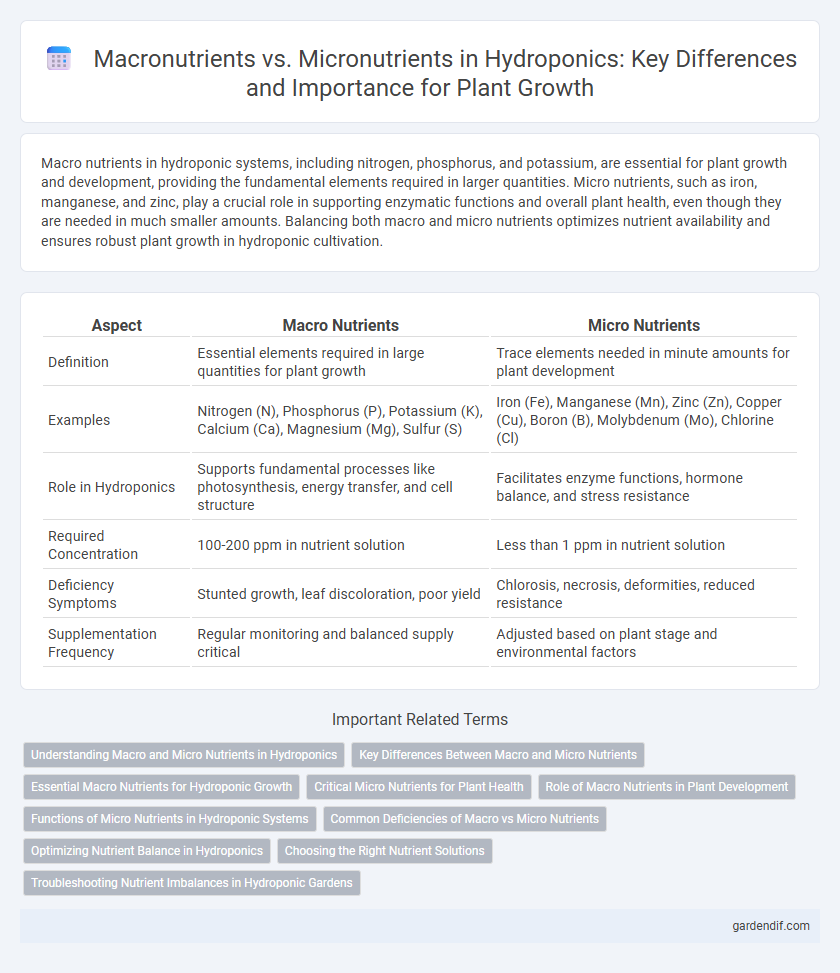
Macro Nutrients vs Micro Nutrients Illustration
Macro nutrients in hydroponic systems, including nitrogen, phosphorus, and potassium, are essential for plant growth and development, providing the fundamental elements required in larger quantities. Micro nutrients, such as iron, manganese, and zinc, play a crucial role in supporting enzymatic functions and overall plant health, even though they are needed in much smaller amounts. Balancing both macro and micro nutrients optimizes nutrient availability and ensures robust plant growth in hydroponic cultivation.
Table of Comparison
| Aspect | Macro Nutrients | Micro Nutrients |
|---|---|---|
| Definition | Essential elements required in large quantities for plant growth | Trace elements needed in minute amounts for plant development |
| Examples | Nitrogen (N), Phosphorus (P), Potassium (K), Calcium (Ca), Magnesium (Mg), Sulfur (S) | Iron (Fe), Manganese (Mn), Zinc (Zn), Copper (Cu), Boron (B), Molybdenum (Mo), Chlorine (Cl) |
| Role in Hydroponics | Supports fundamental processes like photosynthesis, energy transfer, and cell structure | Facilitates enzyme functions, hormone balance, and stress resistance |
| Required Concentration | 100-200 ppm in nutrient solution | Less than 1 ppm in nutrient solution |
| Deficiency Symptoms | Stunted growth, leaf discoloration, poor yield | Chlorosis, necrosis, deformities, reduced resistance |
| Supplementation Frequency | Regular monitoring and balanced supply critical | Adjusted based on plant stage and environmental factors |
Understanding Macro and Micro Nutrients in Hydroponics
Macro nutrients such as nitrogen, phosphorus, and potassium are essential for plant growth in hydroponics, providing the primary building blocks for cellular functions and energy transfer. Micro nutrients, including iron, manganese, zinc, and copper, play critical roles in enzyme activation and chlorophyll synthesis despite being required in smaller quantities. Balancing macro and micro nutrient concentrations in hydroponic nutrient solutions ensures optimal plant health, growth, and yield.
Key Differences Between Macro and Micro Nutrients
Macro nutrients in hydroponics, including nitrogen, phosphorus, and potassium, are required in large amounts for plant growth and development, directly influencing photosynthesis and energy transfer. In contrast, micro nutrients such as iron, manganese, and zinc are needed in trace amounts, playing critical roles in enzyme function and disease resistance. The key difference lies in their quantity of requirement and specific physiological functions essential for optimal hydroponic crop production.
Essential Macro Nutrients for Hydroponic Growth
Essential macro nutrients for hydroponic growth include nitrogen (N), phosphorus (P), and potassium (K), which play critical roles in plant development, energy transfer, and water regulation. Calcium (Ca), magnesium (Mg), and sulfur (S) are also vital macro nutrients, supporting cell wall structure, chlorophyll production, and protein synthesis. Maintaining balanced concentrations of these macro nutrients in hydroponic nutrient solutions directly influences plant health, yield, and nutrient uptake efficiency.
Critical Micro Nutrients for Plant Health
Critical micro nutrients for plant health in hydroponic systems include iron, manganese, zinc, copper, molybdenum, boron, and chlorine, which are essential for enzymatic functions, chlorophyll synthesis, and hormone regulation. Unlike macro nutrients such as nitrogen, phosphorus, and potassium that plants require in larger amounts, micro nutrients are needed in trace quantities but are vital to preventing deficiencies that can impede growth and reduce crop yield. Proper balance and availability of these micro nutrients in hydroponic nutrient solutions ensure optimal physiological and biochemical processes for healthy plant development.
Role of Macro Nutrients in Plant Development
Macronutrients, including nitrogen (N), phosphorus (P), and potassium (K), play a critical role in hydroponic plant development by supporting essential physiological functions such as photosynthesis, energy transfer, and cell division. Nitrogen drives vigorous leaf growth and chlorophyll production, phosphorus enhances root development and flowering, while potassium regulates water uptake and stress resistance. Adequate macronutrient supply ensures optimal plant growth rates, structural integrity, and high crop yields in hydroponic systems.
Functions of Micro Nutrients in Hydroponic Systems
Micro nutrients such as iron, manganese, zinc, copper, molybdenum, boron, and chlorine are vital for enzymatic functions and chlorophyll synthesis in hydroponic systems. These trace elements regulate plant metabolism, enhance nutrient uptake, and support hormone activation crucial for growth and development. Deficiencies in micro nutrients often lead to stunted growth, chlorosis, and reduced crop yields in hydroponically grown plants.
Common Deficiencies of Macro vs Micro Nutrients
Macro nutrients like nitrogen, phosphorus, and potassium are commonly deficient in hydroponic systems, causing symptoms such as yellowing leaves, poor root development, and stunted growth. Micro nutrient deficiencies, including iron, manganese, and zinc, often lead to chlorosis, leaf spotting, and distorted growth patterns. Proper monitoring and balancing of both macro and micro nutrients are crucial to prevent these common deficiencies and ensure healthy hydroponic plant development.
Optimizing Nutrient Balance in Hydroponics
Optimizing nutrient balance in hydroponics requires precise management of macro nutrients such as nitrogen, phosphorus, and potassium, which are essential for plant growth and development. Micro nutrients including iron, manganese, zinc, and copper play critical roles in enzyme function and chlorophyll synthesis, despite being required in smaller quantities. Ensuring the correct ratio and concentration of both macro and micro nutrients enhances nutrient uptake efficiency, promotes healthy plant metabolism, and maximizes crop yield in hydroponic systems.
Choosing the Right Nutrient Solutions
Macro nutrients such as nitrogen, phosphorus, and potassium are essential for hydroponic plants as they support fundamental growth processes and high yield development. Micro nutrients like iron, manganese, and zinc play a crucial role in enzyme function and overall plant health, preventing deficiencies that could stunt growth. Selecting the right nutrient solution for hydroponics requires balancing these macro and micro nutrients based on the plant species and growth stage to optimize nutrient uptake and plant performance.
Troubleshooting Nutrient Imbalances in Hydroponic Gardens
Macro nutrients like nitrogen, phosphorus, and potassium are essential for robust plant growth, but imbalances often cause visible symptoms such as leaf yellowing or stunted growth in hydroponic gardens. Micro nutrients, including iron, manganese, and zinc, play critical roles in enzymatic functions and chlorophyll production, and deficiencies can lead to discoloration and poor development. Regular monitoring of nutrient solution pH and electrical conductivity, along with targeted supplementation, helps troubleshoot and correct these nutrient imbalances to maintain optimal plant health in hydroponic systems.
Macro Nutrients vs Micro Nutrients Infographic

 gardendif.com
gardendif.com